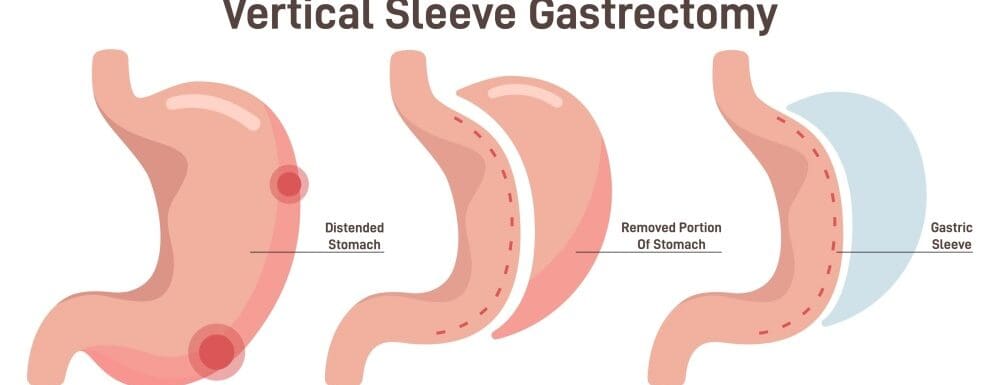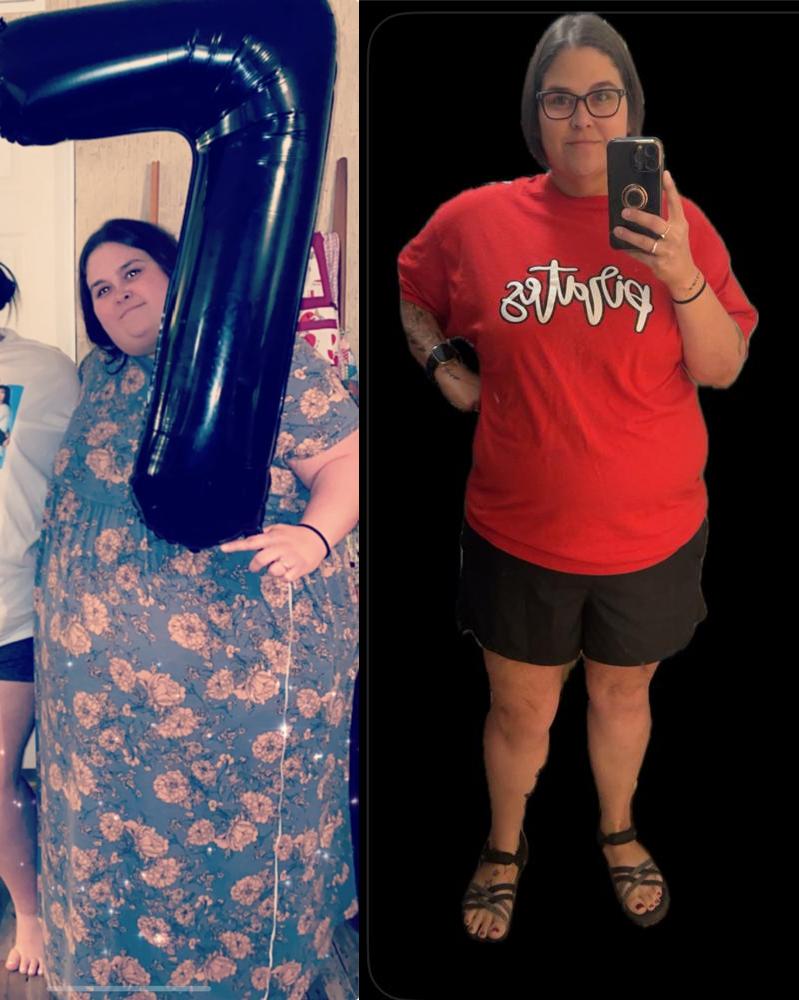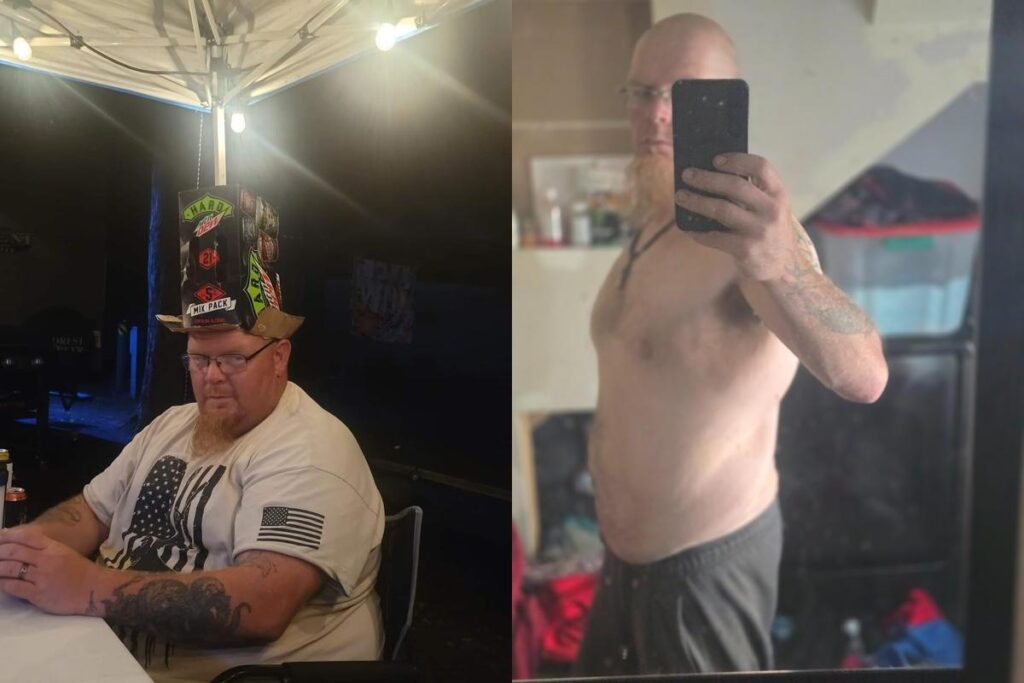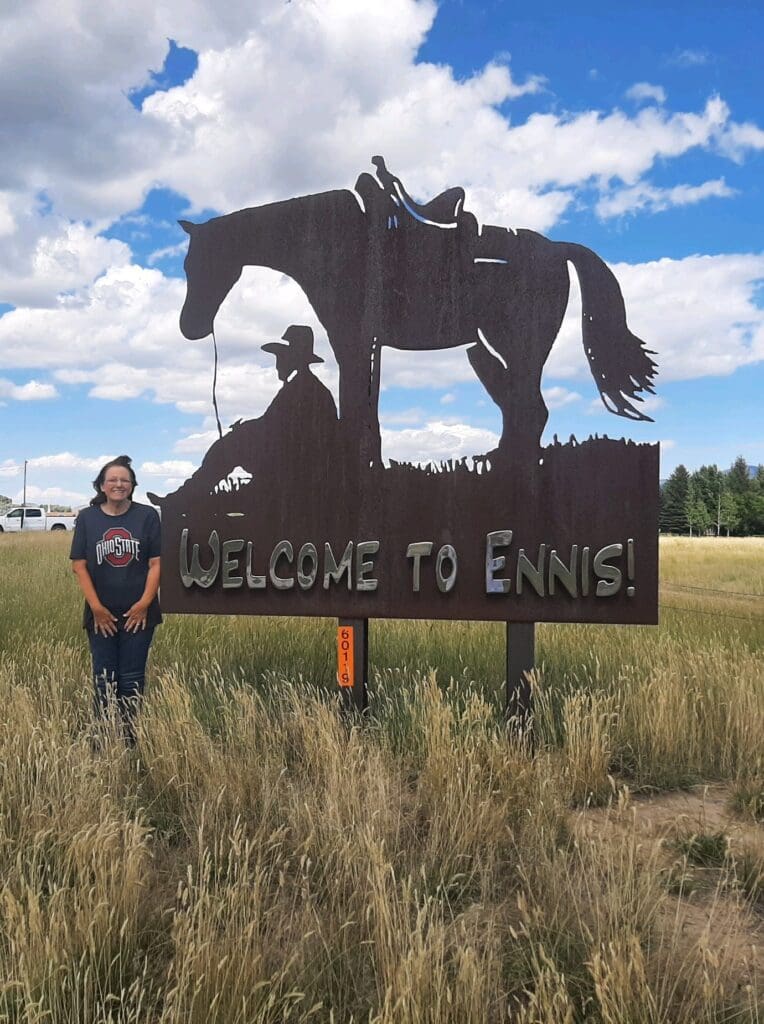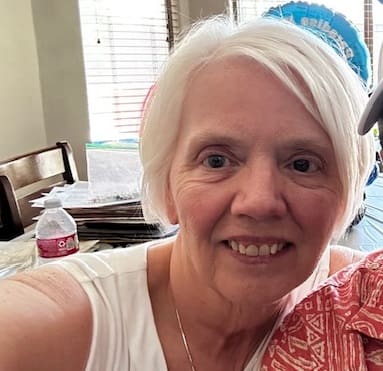
Medical Director
The gastric sleeve (also known as VSG) has become the most popular weight loss surgery in the world. If you are thinking about a VSG, you probably have one of two things on your mind:
- What are the insurance requirements for a gastric sleeve/VSG?
- If I don’t have insurance coverage, what is the self-pay cost of a gastric sleeve/VSG?
Stay tuned and I will answer your gastric sleeve cost questions and more so that you can make an informed decision.
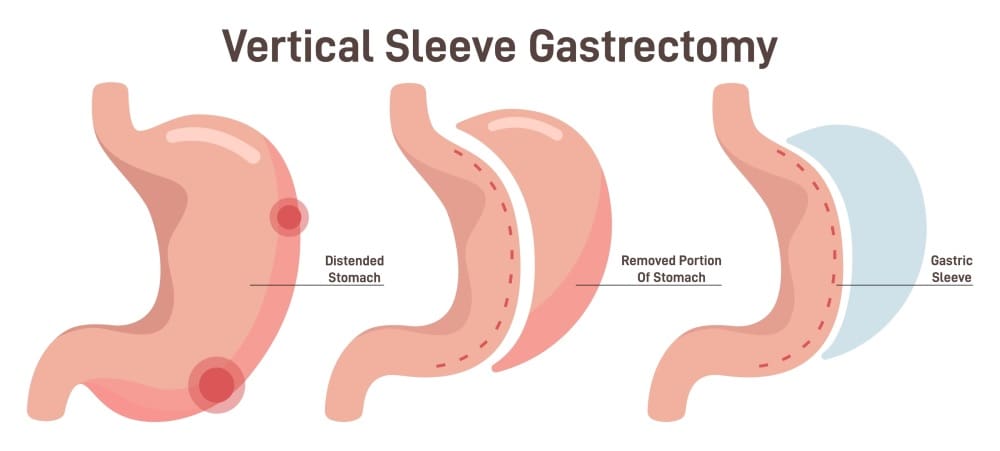
Before we break down gastric sleeve cost, let’s talk about what a gastric sleeve (VSG) surgery is, why it works, and why it has become the most popular weight loss surgery today.
What is a gastric sleeve surgery?
A gastric sleeve procedure involves a few very small incisions and a short general anesthesia. During the procedure, we use some long, thin instruments to do the operation laparoscopically. During a gastric sleeve surgery, the part of the stomach to the right in the image above is removed. A high tech stapling device is used to seal off the stomach so that at the end of the operation, it becomes just a long narrow tube, similar to a “sleeve on a jacket.” At JourneyLite, we are specialists in outpatient weight loss surgery, so most patients are able to go home the same day after a VSG.
You can see a sped-up video of me, a surgeon specializing in weight loss procedures, performing a gastric sleeve surgery in this video.
How does a gastric sleeve work?
To put it simply, a gastric sleeve works by reducing the size of the stomach to limit food intake and promote weight loss. Picture your stomach transformed from a big storage tank into a small one after VSG surgery. Unlike a gastric bypass, though, the small bowel does not get re-routed. This makes the risk a lot lower.
There are also some complex gut hormonal changes that take place after taking out a decent portion of the stomach. This leads to lower hunger levels for nearly all patients. This tends to be greatest for the first 6 months or so, and eventually starts to bounce back.
It usually never gets back to the level that it was prior to surgery, but patients do need to be ready for the fact that they have a certain window for weight loss. You need to use this window wisely! In patients who do, they will lose a lot of weight. Then, as the hunger starts to return, the weight loss will slow and eventually stop. Smaller portion sizes will persist, helping to keep the weight off. But the operation is not magic, and the patient has to continue to put the work in to succeed in the long-run!
How Much Does Gastric Sleeve Surgery Cost ?
The cost of gastric sleeve surgery in the US varies, with prices ranging from $10,000 to $30,000. At our outpatient surgery center in Ohio, the average gastric sleeve surgery cost is around $13,000. The broad cost range is influenced by factors including insurance coverage, location, and post-op care that affect total VSG procedure costs. It’s essential to consider these variables when estimating the expense of your surgery.
For a limited time, JourneyLite is offering gastric sleeve surgery for $10,000. Learn more here.
Factors That Influence VSG Surgery Cost
- Location: The geographical location where the surgery is performed plays a significant role in determining the cost. For instance, the gastric sleeve cost in Ohio might differ from the cost in New York or California due to variations in the cost of living, demand for the surgery, and operational expenses in different states.
- Insurance Coverage: Insurance coverage is a crucial factor. The extent of coverage, deductibles, co-pays, and whether the insurer considers the procedure medically necessary can significantly impact the out-of-pocket expenses for the patient.
- Surgeon’s Experience: The expertise and experience of the surgeon can also impact the cost. Highly experienced surgeons who have a track record of success with gastric sleeve surgeries might charge more for their specialized skills and knowledge.
- Hospital or Surgery Center: The choice between having the surgery at a hospital or a specialized surgical center can influence the cost. Hospitals might have additional facilities and emergency care options unrelated to gastric sleeve surgery, leading to higher costs compared to outpatient surgery centers like JourneyLite.
- Pre and Post-Operative Care: The cost may also include pre-operative evaluations and post-operative care. These may encompass nutritional counseling, psychological assessments, follow-up appointments, and other necessary care services to ensure a successful outcome. For self-pay patients, JourneyLite includes 1 full year of surgery-related office care in the price.
Why is the gastric sleeve the most popular weight loss surgery in the world?
Over the last 50 years, there have been several operations that have held this honor:
- Open VBG (vertical banded gastroplasty): This was very popular back in the 90’s, but fell out of favor because of poor long-term results and complications related to the band at the top of the stomach.
- Open RNY (roux-en-y) gastric bypass): This replaced VBG as it had better results and lower complication rates. However, since it was open surgery, the short-term risk was too high.
- Laparoscopic RNY gastric bypass: Around 2000, techniques were developed to be able to do a full gastric bypass laparoscopically. Although it had a complication rate about the same as open gastric bypass at first, once surgeons got better at laparoscopic surgery, the short-term risk came down a lot.
- Lap Band: Due to a much lower short-term risk, the Lap Band started to edge out gastric bypass, and around 2008 became the most common weight loss surgery. A higher rate of long-term issues and poor results in high BMI patients led to it falling out of favor.
The gastric sleeve then passed the Lap Band in 2016 as the most common weight loss surgery in the world. The reason is because the gastric sleeve has power closer to gastric bypass, but shares a lower risk (and faster recovery) that is closer to gastric band. For most patients, this is a great option! But patients do need to consider VSG surgery cost. Read on to learn about costs for gastric sleeve surgery with and without insurance.
Gastric Sleeve Cost with Insurance: Your Guide
If you are thinking about VSG surgery, the first thing you should check is your insurance. Some patients will have weight loss surgery benefits and others will not. Medicare and Medicaid typically does cover it, if you meet their guidelines. For regular insurance though, you have to check your benefits. Some employers will offer weight loss surgery coverage and some will not. I have already published a great article that guides you through this process here: Do I have coverage for weight loss surgery?.
Gastric Sleeve Cost Without Insurance: Self Pay Guide
If you check your coverage and you ran into a dead end, you can still have surgery through self-pay options. The price of a gastric sleeve can range from $10,000 to $30,000 depending on where you live. Prices outside the U.S. can be lower but there are serious concerns about quality of care, and lack of access to post-op care. Although we do take insurance and are in network with most plans, JourneyLite also specializes in providing affordable self-pay options for patients. Currently we offer one of the lowest prices for self-pay gastric sleeve in Ohio at only $10,000. This includes surgery, facility stay, hotel stays for out-of-town patients, and one year of surgery-related office care.
If you are price-shopping, make sure you take two things into consideration:
- Is the facility MBSAQIP-accredited? If they are, this means higher quality outcomes usually. If not, there could be serious quality issues. JourneyLite is MBSAQIP-accredited. We also hold several other quality honors such as Anthem Blue Distinction Plus, Optum Bariatric Center of Excellence, and Aetna Institute of Quality.
- Is the price listed the actual price, or are there thousands of dollars of cost on the back end? We have transparent self-pay pricing for all of our procedures which you can see here.
Some patients may be lucky enough to have the cash on hand, but most will pursue financing options. This will usually be medical financing (CareCredit, etc), a home equity loan, or a loan against a 401k. Our patient service representatives can help advise you on the steps to take, if you haven’t already checked it out. Just give them a call at 513-259-2555, or you can also refer to the pricing link above which has links for CareCredit and Kemba financing. You can simply apply online and get a quick answer on approval.
It may be more affordable thank you think, as there are a few other things to consider if you are thinking about self-paying for weight loss surgery:
- Reduced food cost: It is estimated that surgical weight loss patients spend at least $100/month less on food.
- Reduced medication cost: The cost savings here can be significant, especially if you are a diabetic.
- Tax deductible medical expense: Consult with your accountant, but in most cases your full payment for surgery (and any miscellaneous costs) can be deducted on your tax return as a medical expense.
Gastric Sleeve Surgery FAQs
How much do you have to weigh to get gastric sleeve?
Qualification for weight loss surgery is based on body mass index (BMI), not weight. Patients in some cases can qualify for a gastric sleeve with a body mass index as low as 30. You can check your BMI here!
How can I pay for gastric sleeve surgery?
There are multiple options available to help manage VSG surgery cost. I will guide you through them:
Insurance Coverage
- Health Insurance: First and foremost, I recommend checking with your health insurance provider. Many insurance plans cover bariatric surgery if it is deemed medically necessary. Our office can assist you in understanding your coverage, eligibility criteria, and any pre-approval requirements.
Self-Pay
Out-of-Pocket: Some patients opt to pay out-of-pocket. This allows for immediate scheduling of the surgery without the need to navigate insurance approvals.
Financing Options
- Medical Loans: There are specialized medical loans available from various financial institutions. These loans are specifically designed to cover medical expenses, offering competitive interest rates and flexible repayment terms.
- Home Equity Loans: If you own your home, a home equity loan will most likely help you achieve the lowest interest rate.
- 401k/Retirement Plan Loan: Some patients can qualify for a loan against their 401k or other retirement plan. Check with your human resources department to find out about your options to assist with VSG surgery costs.
Health Savings Accounts (HSAs) and Flexible Spending Accounts (FSAs)
- HSAs/FSAs: If you have an HSA or FSA, you can use these funds to pay for a portion of the surgery. These accounts allow for tax-free savings to be used for medical expenses.
Does health insurance cover the cost of gastric sleeve surgery?
Health insurance coverage for gastric sleeve surgery can vary widely depending on the specific insurance plan and the patient’s individual health status. Many insurance providers do cover the cost of the surgery if it is deemed medically necessary, meaning the patient has a BMI of 40 or more, or a BMI of 35 or more with associated comorbidities like diabetes or hypertension.
It’s essential for patients considering gastric sleeve surgery to contact their insurance provider directly to understand the coverage details, eligibility criteria, and any required documentation or pre-approval processes. JourneyLite accepts most major insurance providers.
In conclusion, gastric sleeve has been shown to be an effective tool for weight loss. The long-term results are much better than even the newest weight loss meds. It can change your life by not only helping you lose weight, but also resolving serious medical issues like diabetes and sleep apnea. And, with recent advances, it can safely be done on an outpatient basis. Most patients can be back to work in a week or two. If you suffer from obesity, it could be a great option so give it a closer look. You can also check out some of our patient testimonials!

Medical Director
Dr. Trace Curry is the Medical Director of JourneyLite Surgery Center and JourneyLite Physicians. With locations in Ohio, Kentucky, and Indiana, he has a comprehensive obesity treatment team offering weight loss surgery, gastric balloon, and weight loss medications. If you would like to make a virtual or in-person appointment with Dr. Curry to discuss your weight loss options, just call us at (513) 259-2555 or click on the "Appointment" button!

